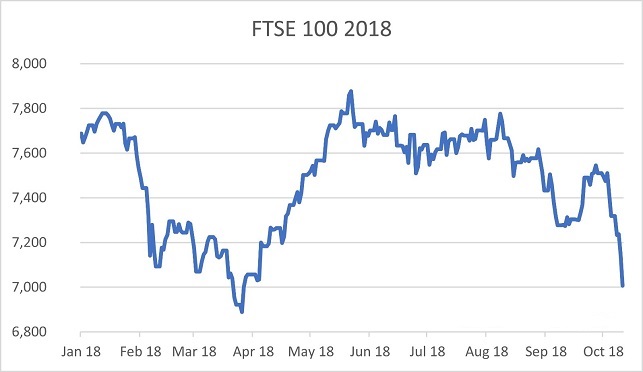Why private investors have advantage over fund managers
15th October 2018 12:50
by Douglas Chadwick from interactive investor
This content is provided by Saltydog Investor. It is a third-party supplier and not part of interactive investor. It is provided for information only and does not constitute a personal recommendation.
We could be in for another challenging week, but Saltydog analyst Douglas Chadwick had already been switching to cash in recent months. He explains what his trigger was, here.

Time to batten down the hatches
During last week we saw stockmarkets around the world fall, mainly in response to increasing bond yields and concerns about rising inflation and interest rates.
In the UK, the FTSE 100 lost 4.4% during the week and is now down 9% since the beginning of the year.
Although the index has fallen off a cliff since the beginning of October, it hasn't actually made any real progress since the end of May.

Source: Morningstar Past performance is not a guide to future performance
At Saltydog Investor we believe that people should actively manage their investments. One of the key advantages is that when markets stagnate, or are going down, it’s possible to reduce your exposure to equities and head for safety until the storm passes.
This is something that many fund managers simply aren't allowed to do. Unit Trust and OEICs are grouped into sectors which are classified and managed by the Investment Association. This means that investors can easily see what type of assets a fund is investing in.
For example, funds in the 'UK All Companies' sector are defined as "funds which invest at least 80% of their assets in UK equities which have a primary objective of achieving capital growth." This means that even if UK companies aren't performing well, and the fund manager thinks that they may continue to go down before they start to recover, the fund must still invest at least 80% in UK equities.
As private investors we don't have that constraint.
Every week we analyse thousands of funds. We group them by sector and then combine the sectors into our own proprietary Saltydog Groups which are:
• Safe Haven.
• Slow Ahead.
• Steady as She Goes.
• Full Steam Ahead - Developed Markets.
• Full Steam Ahead - Emerging Markets.
The nautical names of these groups give an easily recognisable indication of the volatility of the sectors and funds which are allocated to the groups. Using the performance data it is then easy to see whether the increased risk associated with the more volatile funds is being rewarded.
Over the last couple of months it's been hard to justify being in the more volatile funds and so, even before last week, we had already taken steps to rebalance the Saltydog demonstration portfolios. We believe that cash is as valid an asset as any other and, when markets aren’t going up, we often increase the cash levels in the portfolios. This gives us the opportunity to limit our losses and be ready to reinvest when the markets turn.
During September we doubled the amount of cash in our portfolios. Our more cautious portfolio, the Tugboat, had less than 50% invested at the beginning of October and so that has helped over the last couple of weeks.
Overnight we saw further falls in the Chinese and Japanese stockmarkets, and the European indices were down this morning. We could be in for another challenging week!
For more information about Saltydog Investor, or to take the two-month free trial, go to www.saltydoginvestor.com.
These articles are provided for information purposes only. Occasionally, an opinion about whether to buy or sell a specific investment may be provided by third parties. The content is not intended to be a personal recommendation to buy or sell any financial instrument or product, or to adopt any investment strategy as it is not provided based on an assessment of your investing knowledge and experience, your financial situation or your investment objectives. The value of your investments, and the income derived from them, may go down as well as up. You may not get back all the money that you invest. The investments referred to in this article may not be suitable for all investors, and if in doubt, an investor should seek advice from a qualified investment adviser.
Full performance can be found on the company or index summary page on the interactive investor website. Simply click on the company's or index name highlighted in the article.